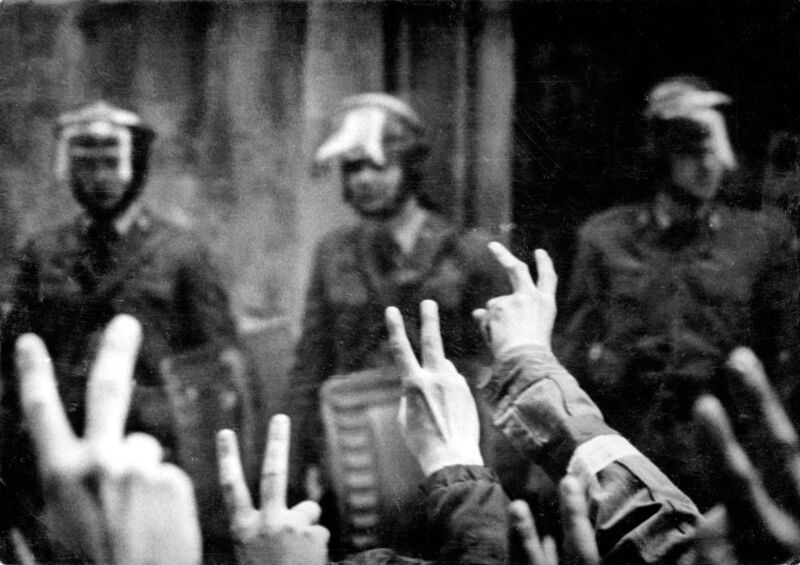The Darkness Descends, proclaimed Time, the US weekly, on its cover. It was 28 December 1981. The third week of martial law was beginning in Poland. For Polish people who barely several months earlier finally believed they could be a host in their own country, the times were dark indeed. Communist leader Wojciech Jaruzelski, depicted by Time in his distinctive military uniform, did not hesitate to use the entire force of the state – including the army – against the Polish people.
Communists’ War on the Nation
After the Second World War, Poland got under the Soviet Union’s sphere of influence. The Communists rigged elections, eliminated the legal opposition and bloodily clamped down on the independence underground. In the following years, they brutally suppressed all social protests – in Poznań (1956), in the coastal cities (1970), in Radom and in Ursus SA (1976).
The Polish gene of freedom, however, was inherited by later generations. John Paul II’s pilgrimage to his homeland (1979) raised hope for change. During a mass celebrated in one of Warsaw’s central squares, the Polish Pope called for the Spirit to renew the face of “this land”. The long-awaited renewal came a year later. In the summer of 1980, thousands of Poles demanded improved living conditions and free trade unions. That is how Solidarity was born. It was a multi-million-strong social movement independent of the communist authorities – a phenomenon in the entire Eastern Bloc.
But the freedom festival did not last long. Jaruzelski’s regime rolled tanks onto the streets to suppress the peaceful Solidarity revolution. Even before the communist junta proclaimed martial law, Interior Ministry officers detained hundreds of people on the night of 13 December 1981: leading trade unionists and anyone considered a potential organiser of resistance.
They broke down my door and took me to the police station, recalls Jan Ludwiczak, 44-year-old at the time and head of the Solidarity movement at the Wujek Coal Mine in Katowice. The militia severely beat his colleagues who tried to defend him. When the miners called a strike in response, the authorities did not hesitate to use weapons. The bullets killed nine people.
Martial law – imposed in violation even of the communist law – meant not only thousands of internees and convicts but also dozens of deaths. Some died from gunshots, others from beatings. Others still, in vague circumstances. The perpetrators felt untouchable, as the communist prosecutors were reluctant to take action against them. Investigations were initiated, but they were carried out laxly, with a preconceived assumption, and were usually quickly dismissed. The same happened with the investigation into the “incidents” at the Wujek Coal Mine, which was dropped already in January 1982. Those who shot at the miners or gave the order to shoot came out of the proceedings unscathed. Other cases were similar. Indeed, the parliamentary commission, which looked into the cases years later, stated that “the entire apparatus of the state administration of justice was involved in an extensive system guaranteeing impunity for the criminals from the Ministry of the Interior (MSW)”.
Sentences were handed down, however, not to the perpetrators but to their victims. In February 1982, a military court sentenced four Wujek miners. They were imprisoned for the strike they organised in the first days of martial law. Zofia Pietkiewicz, at the time a 50-year-old activist of the Solidarity movement suspended by the authorities, was sent to prison for taking part in an opposition demonstration in Koszalin. Ewa Kubasiewicz, 41, was imprisoned for participating in a strike in Gdynia and co-creating a leaflet calling for resistance. After being released, people like them continued to be harassed and invigilated.
Harsh repression did not break the Polish spirit of freedom. Solidarity acted underground and continued to live in the hearts of the Polish people. When the authorities finally permitted independent candidates to participate in the parliamentary elections of June 1989, the people spoke out against communism en masse.
However, the democratic transition was partly endorsed by people who had previously been the faces of martial law. Jaruzelski took over the newly created presidential office, and Czesław Kiszczak, the long-serving head of the Interior Ministry, also remained in office in Tadeusz Mazowiecki’s so-called Solidarity government. Not much changed in the justice administration and prosecutor’s office. As a result, for many years to come, there was no chance to hold anybody to account for the crimes of martial law and give back elementary justice to the victims. Romuald Cieślak, the commander of the platoon responsible for the deaths of the Wujek miners, was legally sentenced to six years in prison no sooner than in 2008. Many who deprived people of their lives or freedom during martial law did not live to stand trials or receive a sentence at all.
Restore justice
Every 13 December, we pay tribute to the martial law victims in Poland. But the Institute of National Remembrance, which I have the honour of managing, is trying to go a step further. As much as it is still possible, we want to rectify the neglect of the first years after the fall of the communist system. It is precisely for this purpose that our Institute launched the Archive of Crimes project this year. Our prosecutors and the historians who support them will once again examine the crimes of the 1980s. We are sending a clear message to those who killed and convicted oppositionists back then: you cannot sleep soundly, even if you are protected by judicial immunity.
Karol Nawrocki
